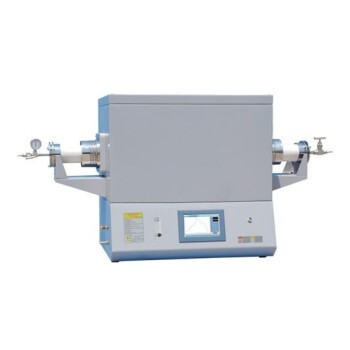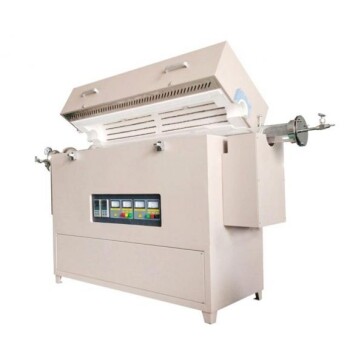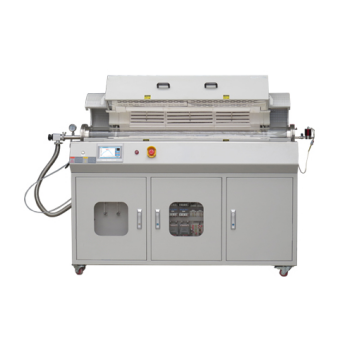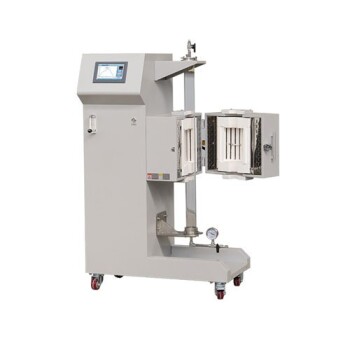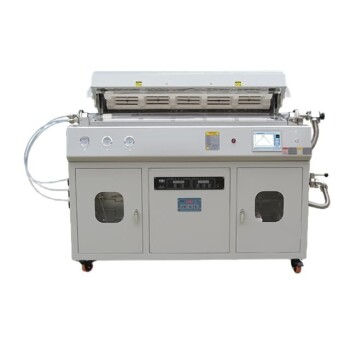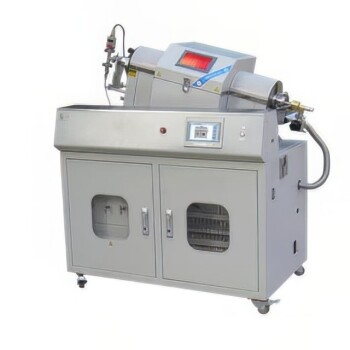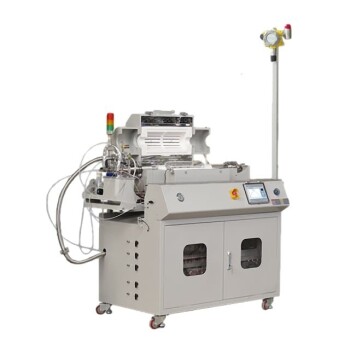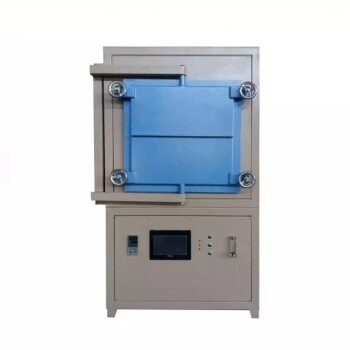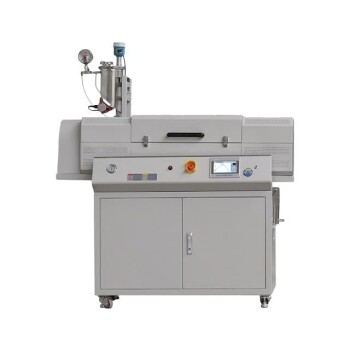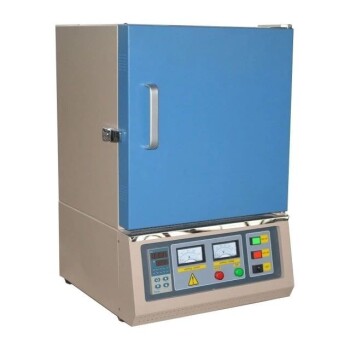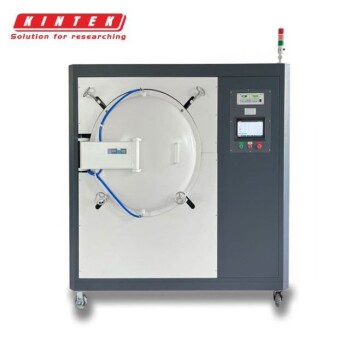At its core, a tubular furnace is an exceptionally versatile piece of high-temperature equipment used across research and industry. Its primary applications involve thermal processing where precise control over both temperature and atmosphere is critical, such as in material science, chemical synthesis, metallurgical heat treatment, and semiconductor fabrication.
The defining feature of a tubular furnace isn't just its ability to get hot, but its capacity to create a highly controlled and isolated environment. This makes it less of a simple oven and more of a precision thermal reactor for samples that fit its cylindrical geometry.
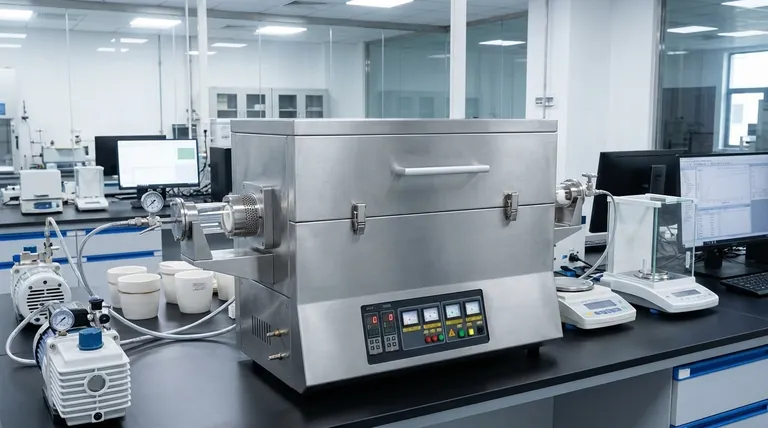
The Core Principle: A Controlled Processing Environment
Unlike a standard box furnace that heats a large chamber in ambient air, a tubular furnace is designed around a central tube, typically made of ceramic, quartz, or metal. This fundamental design difference enables its most important capabilities.
Achieving Precise Temperature Uniformity
The cylindrical heating elements surrounding the tube provide exceptionally even heat distribution. This thermal uniformity is critical for processes where every part of the sample must experience the same temperature to ensure consistent results, such as in material property testing or crystal growth.
Mastering the Atmosphere
The tube can be easily sealed at both ends, allowing for complete control over the internal environment. This is the key that unlocks many of its most advanced applications. You can pull a vacuum to remove reactive gases or introduce a specific, controlled atmosphere of inert gases (like argon) or reactive gases (like hydrogen) to drive specific chemical changes.
Accommodating Unique Sample Geometries
The tubular shape is inherently suited for processing long, thin items like wires or rods. It is also ideal for holding crucibles with powdered samples or for creating continuous-flow reactors, where gases or vapors are passed through the hot zone for chemical synthesis or purification.
A Breakdown of Key Application Areas
The combination of uniform heat and atmospheric control makes the tubular furnace a staple in numerous fields for a wide range of thermal processes.
Material Science and Research
This is one of the broadest application areas. Researchers use tubular furnaces for synthesizing novel materials like graphene or advanced polymers, performing accelerated aging tests on components, and purifying organic and inorganic compounds through processes like sublimation.
Metallurgical Heat Treatment
Tubular furnaces are essential for modifying the properties of metals and ceramics. Common processes include:
- Annealing: Softening a material to make it more workable.
- Hardening: Heating and cooling a metal to increase its strength.
- Sintering: Fusing powdered materials together with heat, just below their melting point.
- Brazing: Joining two pieces of metal using a filler metal in a controlled, oxygen-free environment.
Chemical and Energy Processes
The furnace's tube acts as a perfect micro-reactor for high-temperature chemistry. It's used for catalyst research, where gases are passed over a catalytic material to test its effectiveness. It is also instrumental in developing next-generation energy technologies, including solid oxide fuel cells, biomass conversion, and hydrogen pyrolysis.
Electronics and Calibration
In the electronics industry, purity and precision are paramount. Tubular furnaces are used for creating semiconductors, batteries, and other sensitive components. They are also a standard tool for the high-accuracy calibration of thermocouples, ensuring temperature sensors used elsewhere are giving correct readings.
Understanding the Trade-offs
While incredibly versatile, a tubular furnace is not the universal solution for all heating tasks. Understanding its limitations is key to using it effectively.
The Constraint of Sample Size
The most obvious trade-off is the sample size. The diameter of the tube inherently limits the dimensions of the object being heated. For large, bulky items, a box furnace or chamber furnace is a more practical choice.
Best for Batches and Experiments
While some configurations allow for continuous processing, most tubular furnaces are best suited for experimental work, process development, and small-batch production. They are generally not the tool for high-volume manufacturing of individual parts.
The Complexity of Atmosphere Control
The ability to control the atmosphere is a major advantage, but it also adds complexity. Operating a furnace with vacuum pumps, gas flow controllers, and safety interlocks for flammable gases requires more expertise and setup than simply heating a sample in air.
Making the Right Choice for Your Goal
Selecting the right thermal equipment depends entirely on your objective. A tubular furnace is the superior choice when your process requires precision and control over a small volume.
- If your primary focus is high-purity synthesis or processing: A tubular furnace is essential for its ability to create a vacuum or a controlled inert gas atmosphere.
- If your primary focus is consistent heat treatment of small parts: The exceptional thermal uniformity of a tubular furnace ensures repeatable material properties.
- If your primary focus is a continuous-flow chemical reaction: The furnace's tubular geometry is specifically designed to function as a high-temperature chemical reactor.
- If your primary focus is simple heating of non-reactive materials in air: A less complex and more cost-effective box furnace may be a better fit for your needs.
By understanding its core strength—precise environmental control—you can effectively leverage a tubular furnace for a vast range of advanced thermal processes.
Summary Table:
| Application Area | Key Processes | Key Features |
|---|---|---|
| Material Science | Graphene synthesis, accelerated aging, sublimation | High thermal uniformity, controlled atmosphere |
| Metallurgical Heat Treatment | Annealing, hardening, sintering, brazing | Precise temperature control, oxygen-free environments |
| Chemical and Energy Processes | Catalyst research, solid oxide fuel cells, hydrogen pyrolysis | Continuous-flow reactor capability, gas handling |
| Electronics and Calibration | Semiconductor fabrication, thermocouple calibration | High purity, accuracy in temperature settings |
Leveraging exceptional R&D and in-house manufacturing, KINTEK provides diverse laboratories with advanced high-temperature furnace solutions. Our product line, including Muffle, Tube, Rotary Furnaces, Vacuum & Atmosphere Furnaces, and CVD/PECVD Systems, is complemented by our strong deep customization capability to precisely meet unique experimental requirements. Whether you need precise temperature control, uniform heating, or specialized atmosphere management for material science, metallurgy, or chemical synthesis, KINTEK's tubular furnaces deliver reliable performance tailored to your needs. Contact us today to discuss how we can enhance your thermal processing efficiency and achieve superior results!
Visual Guide

Related Products
- 1700℃ High Temperature Laboratory Tube Furnace with Quartz or Alumina Tube
- 1400℃ High Temperature Laboratory Tube Furnace with Quartz and Alumina Tube
- High Pressure Laboratory Vacuum Tube Furnace Quartz Tubular Furnace
- Multi Zone Laboratory Quartz Tube Furnace Tubular Furnace
- Split Multi Heating Zone Rotary Tube Furnace Rotating Tube Furnace
People Also Ask
- What role does a laboratory tube furnace perform during the carbonization of LCNSs? Achieve 83.8% Efficiency
- What safety measures are essential when operating a lab tube furnace? A Guide to Preventing Accidents
- How do vertical tube furnaces comply with environmental standards? A Guide to Clean, Efficient Operation
- How is a high-temperature tube furnace utilized in the synthesis of MoO2/MWCNTs nanocomposites? Precision Guide
- What are the key operational considerations when using a lab tube furnace? Master Temperature, Atmosphere & Safety
